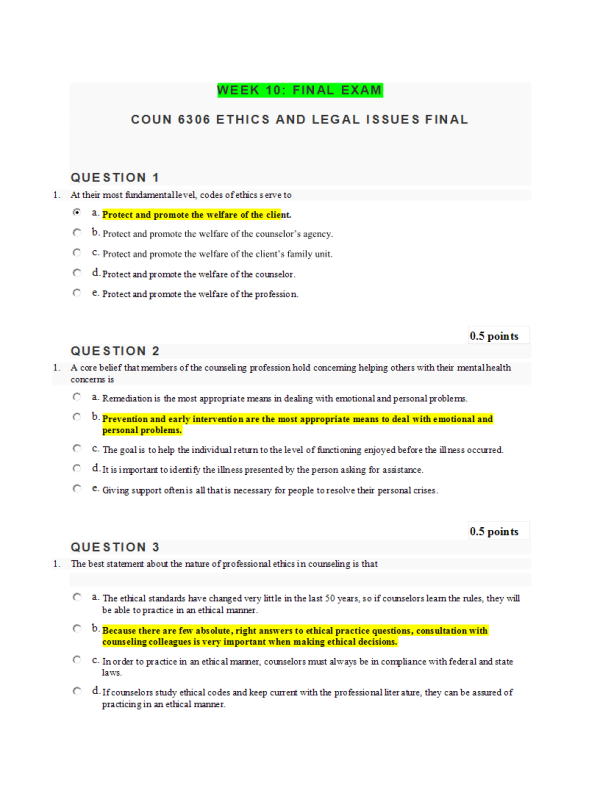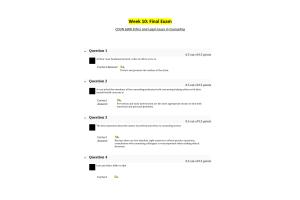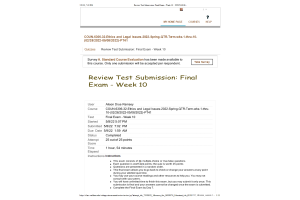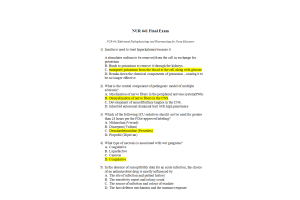COUN 6306 Ethics and Legal Issues; Week 10 Final Exam (Score 25 out of 25 Points)
Course : COUN 6306 Ethics and Legal Issues in Counseling
Contributed : Megan
- $39.00
- Question: At their most fundamental level, codes of ethics serve to
- Question: A core belief that members of the counseling profession hold concerning helping others with their mental health concerns is
- Question: The best statement about the nature of professional ethics in counseling is that
- Question: Law and ethics differ in that
- Question: Counselors who function according to mandatory ethics
- Question: School counselors have a legal obligation to do all of the following EXCEPT:
- Question: Privileged communication statutes
- Question: During the time that a counseling student is counseling clients in a practicum or internship setting, the student counselor
- Question: When a counselor who is working under supervision shares confidential information about clients with her or his supervisor
- Question: A counselor who is under the clinical supervision of another counselor should
- Question: Friendships with former clients
- Question: The primary difference between a boundary crossing and a boundary violation is
- Question: Laws
- Question: While principle ethics asks the question, “What should I do?” virtue ethics asks the question,
- Question: Supervision agreements between a clinical supervisor and supervisee
- Question: When a client accuses a counselor of wrongdoing through a complaint with the counselor’s licensure board or through a malpractice law suit filed in court
- Question: Counselors who work in the military may encounter unavoidable dual relationship issues because
- Question: Malpractice is a type of civil lawsuit that can be filed against counseling professionals for practicing in a manner that leads to
- Question: The primary difference between counselors and other mental health professionals is
- Question: When counseling clients who are terminally ill and wish to explore end-of-life decisions, counselors should do all of the following EXCEPT:
- Question: Whether or not a supervisor is likely to be held responsible, along with the supervisee, when a supervisee’s client commits suicide depends on whether
- Question: Once counselors have disclosed their legal questions to their immediate supervisors and have received a response either from the supervisor or from an attorney who is advising them as to the proper course of action,
- Question: Counselors who intend to conduct family counseling as part of their professional practice should
- Question: The term “culturally encapsulated counselor” refers to a counselor who
- Question: The only dual relationships that are prohibited by the ACA Code of Ethics are those
- Question: When counseling clients who have been sexually exploited by a previous mental health professional, counselors should
- Question: Within the counseling profession, the primary goal of counseling is to
- Question: When documenting for self-protection
- Question: Studies regarding cultural bias in diagnosis have shown that
- Question: Minor clients have
- Question: Parents who object to their child’s participation in counseling
- Question: Counselors who practice from a developmental perspective
- Question: As advocates, counselors are aware that
- Question: When reporting suspected child abuse in good faith, counselors should review their particular state statute to determine all of the following EXCEPT
- Question: Which of the following is TRUE of cultural diversity in technology use:
- Question: What mental health professionals are qualified to diagnose using the DSM system?
- Question: When the client is deceased and there is no statutory language dealing with privilege and the death of the holder, the individual who usually is allowed to assert the privilege is
- Question: In distance counseling, informed consent should include
- Question: If a counselor is asked to disclose privileged information about a client who cannot be located, then the obligation to assert the privilege rests with
- Question: It is impossible for counselors to understand all aspects of the law but the best advice for counselors who face legal questions is to
- Question: To be effective when counseling clients with physical disabilities, counselors
- Question: A fundamental tenet of the wellness model is that
- Question: When you have an ethical question and you are having trouble making a decision, counselors are best advised to
- Question: Legal principles view the contents of a client’s counseling records as belonging to
- Question: When a husband subpoenas a counselor to reveal information in a court hearing that was provided by the wife in joint couples counseling sessions, and the wife objects to the information being revealed, the counselor
- Question: Breaches of client confidentiality by counselors
- Question: When a member expresses a desire to drop out of an ongoing group, the counselor should
- Question: The ACA Code of Ethics requires counselors to explain to clients, before testing takes place, all of the following EXCEPT
- Question: With respect to counseling minor clients who are considering abortion
- Question: The following are true of distance counseling services EXCEPT:



